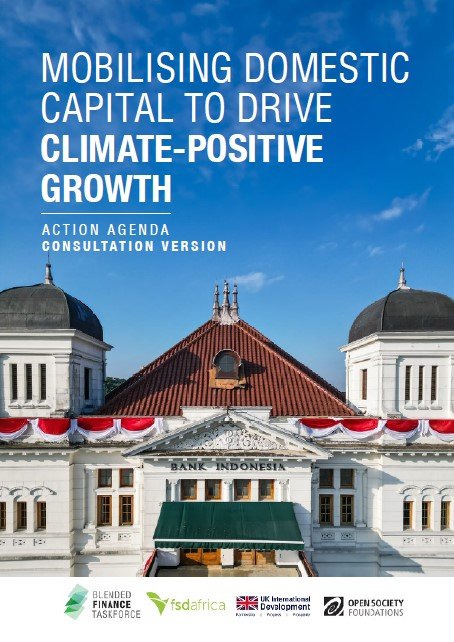MOBILISING DOMESTIC CAPITAL TO DRIVE CLIMATE-POSITIVE GROWTH
Action Agenda - for consultation
This consultation paper presents an action agenda to accelerate positive growth by mobilising and growing domestic capital for climate action. It argues that national action plans, co-created between governments, regulators, private sector and investors could unlock part of the $17 trillion existing private domestic capital. Doing so can create a super-lever to reach financial tipping points for long-lasting growth as investments in climate-positive assets create economic and financial returns that in turn increase domestic capital that can be reinvested in the economy, creating a virtuous cycle for growth, development and job creation.
Emerging Markets and Developing Economies (EMDEs) are home to some of the best climate investment opportunities in the world. Mobilising domestic capital into these opportunities is key to driving sustainable and inclusive growth. Technology tipping points are increasingly making climate-positive solutions in EMDEs commercially attractive. Domestic investors should have privileged access to these investment opportunities. With an estimated ~$17 trillion under management in EMDEs, mobilising domestic capital is a priority for climate action.
The ~$17 trillion of bank savings, insurance and pension assets in EMDEs could nearly triple by 2040. We estimate that domestic capital pools could increase by about $1.5 trillion a year to $45 trillion in 2040, linked to measures to grow and deepen national financial markets and underlying economic growth, which could be increased if domestic capital is invested in climate-aligned infrastructure and other assets. If a majority of the additional domestic capital was deployed in climate-aligned investments and instruments, we could effectively halve the ~$3 trillion annual investment gap for climate action and other SDGs in EMDEs as well as generate a major economic growth programme.
However, three key barriers prevent domestic capital from being invested at speed and scale into climate action, which puts the brakes on the virtuous growth cycle. First, national plans and policies do not yet create sufficient markets and incentives to develop and invest in climate-positive assets. Second, financial market regulation is not fit-for-purpose, for example often limits pension fund investment in infrastructure, private equity and other alternative asset classes that are critical to delivering climate-aligned outcomes. And third, limited availability, affordability or access to the right type of catalytic capital, especially local currency de-risking mechanisms and early-stage financing to develop projects, means domestic capital is not being deployed into climatepositive solutions at scale.
Going forward, governments, regulators and the private sector need to co-create national action plans that build on three essential levers. These national action plans, based on the global action agenda presented in this paper, can mobilise existing domestic capital for investments in climate-positive growth, grow the size of domestic capital and deepen local financial markets. These efforts have to be nationally driven but supported where possible by international climate and development finance institutions. National action plans for accelerating climate-positive growth through domestic capital can be based on three essential levers:
Grow domestic assets, by designing and implementing national and sectoral economic investment plans that drive climate-positive growth
Update financial regulations to grow local financial markets and enable and incentivise investments contributing to climate-positive growth
Scale local currency financial mechanisms that use public capital catalytically to mobilise domestic capital by de-risking investments and building the project pipeline
The time to pursue this agenda is now. The widespread recognition of the imperative for climate action, coupled with growing investment opportunities, creates powerful momentum for co-ordinated action to successfully strengthen financial markets. Implementing this action agenda over the next 24 months could help capture significant opportunities for long-lasting climate-positive growth that creates jobs and help deliver the sustainable development goals.
We encourage input, case studies and suggestions to strengthen and progress this action agenda. Please reach out to [email protected] with any questions and thoughts.


